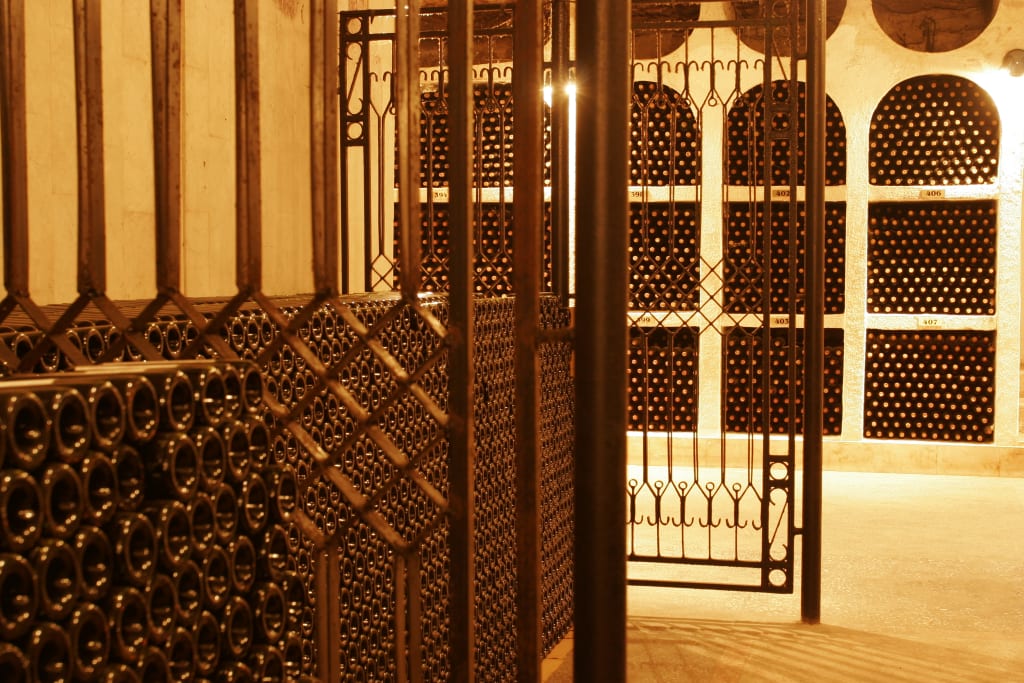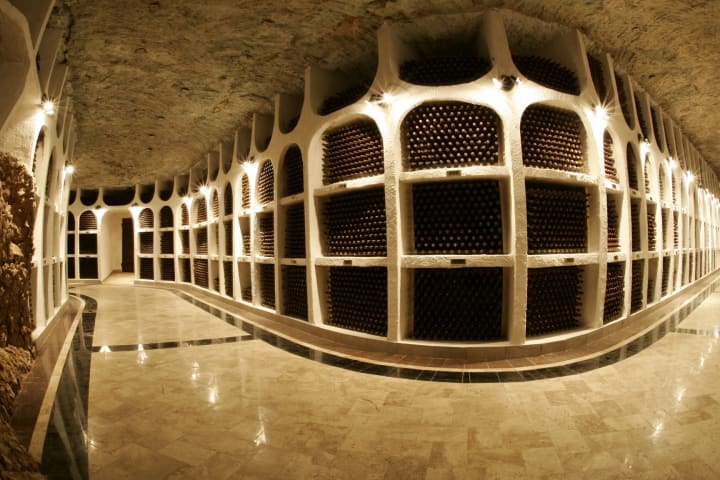Exploring an Underground Wine World
Moldova is not your usual wine country experience.

It has both Slavic and Latin influences, both in terms of genetics and wine production, and is geographically sandwiched between the ex-Soviet Republic of the Ukraine and Romania, both of which have fought over its sovereignty for decades.
It is one of the poorest countries in Europe and one that survives, sadly, primarily on a mix of agriculture and the sex trade. Unrest caused by years of debatable governments and the alleged theft of $1 billion by a former local politician—estimated to be one-eighth of the country's GDP—have caused Chișinău, the capital's, main square to be occupied on and off for months a few years ago. When I first visited, in October two years ago, the annual wine festival was transferred to the countryside, as peaceful political squatters had taken over the square.
The country's major wineries are either privately owned—generally by investors with deep pockets—or remain the property of the state. A handful of wineries even have rare (for Moldova) optical grape sorters, because the management distrusts that the farm workers who have not yet emigrated can do the work on their own.
Moldova is a country that has had to reinvent its wine industry in the past decade, as Russians blockaded its imports in 2006—lifting the ban a year later—citing safety concerns, and producers had to find new markets.
Some of them are making absolutely beautiful wines, primarily from lesser-known grapes such as Feteasca Alba, which is also grown in Romania. But the forklifts that once loaded wines directly onto freight trains to Moscow are long gone. It is a transitional experience that the former Soviet republic of Georgia also knows all too well.
Going Underground
Moldova is home to two of the largest underground wine cellars in the world. Milestii Mici is documented as the largest in the Guinness World Records, but I found Cricova more interesting, as it is home to some curiously notable wine collections. Both wineries are easily accessible from downtown Chișinău, and also supply guests with transit when you book a tasting. It is a chapter in wine marketing from which wineries in other countries could learn quite a lot in terms of reducing drunk driving.
The private tasting rooms at Cricova are constantly booked for events and gatherings. Staff members were wrapping flowers around the banisters leading to the main restaurant for a wedding when we arrived last October. The underground cellars are so large that guests zip around them on Disney-inspired people movers. Each street is named after a grape variety and handy, faux-Ancient Roman maps are posted on the walls along the way. The winery is completely state owned and focuses primarily on sparkling wine production from indigenous grapes.
Vasile Luca has worked at the winery since 2002 and been senior winemaker since 2010. He explained, in a recent interview, that the length of the tunnels totals 120 kilometers (75 miles) and that they feature a unique microclimate, averaging between 12 and 14 degrees Celsius (54-57F) and a relative humidity of 97 to 98 percent. While the winery was founded in 1952, the tunnels date back at least to the 17th Century.
A Walk Through History
The underground walkways are fascinating to navigate, as they are home to esoteric collections of historical wines. Some of these were given to the winery and other created by the Moldovan government in tribute to state political visits, like that of Secretary of State John Kerry in 2013.
Luca estimates that the bottles on display total 20,000. They include wines produced in Europe prior to World War II and "the collections of 11 former Soviet Republics that used to grow grape vines." He estimates that Cricova is home to approximately 56 private collections of major note. He shared that the winery also received an estimated 40,000 visitors last year.
One of the collections was created for Vladimir Putin's 2008 visit. Another, somewhat disturbingly, was confiscated from one of Hitler's top henchmen, Hermann Göring, after the end of the war. His cellar has been stored in the city of Chișinău since 1947, and at the winery since 1967. Luca says that the confiscated wines were divided between "winemakers in the Crimea and Moldova as reparation after World War II."
Göring's collection is rich is Burgundy and great German wines, both sweet and dry. Luca added that these wines have not been tasted by the winemaking staff, as often they only have one bottle of each wine and hence the collection is treated more like a work of art. "It's a treasure which we are admiring and safely keeping for the next generation."
Despite copious research, and some discussion with both American and English marketing executives who consult with Moldovan wineries, I couldn't sort out why the winery would be so proud to exhibit the collection of a major war criminal.
I guess those mysteries are just part of the appeal to a visit to Moldova: it is not what you expect, but it rarely disappoints.
A Look Inside the Cellars at Cricova

You can speed around the cellars on mini trains.
To read more great stories about food, wine and cocktails and learn about my services visit my website at Liza The Wine Chickor keep up-to-date with me through Twitter, Facebook, Linkedin, and Instagram. Cheers!
About the Creator
Liza Zimmerman
Liza has been writing and consulting about wine and food in a savvy, unpretentious way for 20+ yrs. She has visited the major wine and spirits regions and holds the Diploma of Wine & Spirits, the 3-year precursor to Master of Wine.






Comments
There are no comments for this story
Be the first to respond and start the conversation.